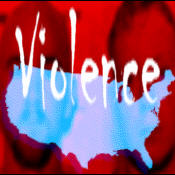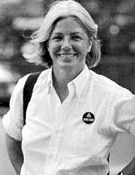 |

|
|
Manhattan Protestors Rise Up Against Violence 'Things Are Getting Worse,' Says Sylvia Rivera |
| By Jack Nichols
Barber moved to Ft. Lauderdale approximately a year ago. He'd spent two decades in Denver, Colorado before moving first to central Florida and, after purchasing rental property there, moving farther south. "He was a kindly man," an anonymous friend of Barber's told GayToday, "a fellow who was interested in the spiritual search. He loved his two dogs fiercely and he was very happy when a landlord rented to him last year and said those big dogs were welcome." The landlord was called to the scene of the crime after neighbors noticed that Barber's hungry dogs were running loose and begging. Police are currently searching for the dead man's missing maroon truck. Los Angeles The week-and-a-half-long trial of Juan Chavez, 34, came to a quick halt after the defendant changed his plea and confessed to murdering five gay men between 1986 and 1989. Chavez had hoped to stop the spread of AIDS, he argued in his own defense. His confession will work to save him from the death penalty. Chavez, who will be sentenced June 21, had gone with the murdered men to their homes on the pretext of sex and had then strangled and robbed them. His crime was discovered after he'd been charged with a 1996 kidnapping. New York City Between 1,500 and 2,000 activists marched in the cold Monday night,—in what was billed a "Political Funeral for Billy Jack Gaither"— protesting against police state tactics and rising violence against minorities. The activists were highly critical of over-reactions by police. The brutal Alabama murder of Billy Jack Gaither and Matthew Shepard as well as the recent unwarranted attack by police (41 shots fired) on Amadou Diallo, a slender 21-year-old innocent, unarmed man who was standing in his own doorway, were major themes in yesterday's political funeral. African-Americans, Latinos, Lesbians, Gay Men and Transgenders took part. New York police behavior has been under close scrutiny, in the wake of violence that officers committed against marchers last fall during Matthew Shepard's massive political funeral. Well-known gay and lesbian activists based in Manhattan told GayToday that the huge police presence at Monday's funeral had been overkill.
Sylvia Rivera said, "There were cops on both sides of us – I felt like we were going to concentration camps." Ms. Rivera, a Stonewall-era veteran and long-time spokesperson for New York's transgendered community told GayToday that she'd overheard a 'male cop' tell a 'woman cop': "If I had an Uzi, I'd blow them all away." The New York march started at 6 p.m. at Columbus Circle in Manhattan. Because of the weather and other factors, the much greater numbers that had shown up for Matthew Shepard's political funeral in warmer weather, were this time reduced by at least 3 thousand. In contrast to autumn's "political funeral," however, a permit to march had been obtained from police authorities. There had been a lengthy debate among activists about requesting such a permit, inasmuch as the city had turned down many other groups for no apparent good reason. According to activist Ann Northrop a pioneering lesbian spokesperson, several people working on their own initiative applied for the permit and said police had, oddly, been waiting to present them with one. Randolfe Wicker, a contributing writer for GayToday, and a pioneering New York activist also, said that although other minorities had been invited, gays at the Billy Jack Gaither's political funeral were disproportionately represented. "There were as many cops as marchers," Wicker said, "It looked like a police convention." The police 'sound permit' had allowed for bullhorns but only at Columbus Circle. Some saw the disallowance of bullhorns elsewhere as a rule that made it more difficult for responsible leaders to control the large crowds. Ms. Northrop agreed, saying, "the cops seize control so that they can disempower the gays and keep the upper hand." New York marchers, if under 500 in number, must march only on city sidewalks. If there are more than 500, however, a singular lane of traffic must be given over to them, which is what became necessary Monday night. The somber march wended southward to Times Square where marchers showed "a moment of anger"—beating placards and demanding that the 4 policemen who'd opened fire on Amadou Diallo be arrested. At Bryant Park an intersection of 42nd Street and 6th Avenue, marchers staged a Die In similar to blockades that often have been staged by ACT UP protesting injustices against people with AIDS. The marchers lay down in the street after heeding a suggestion to do so from a Bryant Park sound system, one apparently operated by a man with a name which was, under the circumstances, rather notable: Jay Walker. Jay Walker was arrested and charged at first with "incitement to riot", according to Ann Northrop who acted as a negotiator with police after it became apparent that the crowd had been enraged by Mr. Walker's arrest. As angry chants of "N.Y.P.D: Racist, sexist anti-gay" rose several pitches, Ms. Northrop warned police: "If you want the crowd to move out of the street—you better release him." The lawmen agreed to free Jay Walker, issuing him instead a summons for disturbing the peace. The Die In came to a halt. The media, which was present in great numbers, surrounded Jay Walker who thereupon gave a press conference. " No justice, no peace," chanted demonstrators. "Things are getting worse. It seems like there are more murders than before," Sylvia Rivera told GayToday. Nearly simultaneously, there were other arrests of activists at Number One Police Plaza. They were protesting call Mayor Giuliani's police Gestapo tactics and the simultaneous rise of violence. These included political notables such as former New York Mayor David Dinkens, U.S. Congressman Charles Rangel and Ms. Margarita Lopez. On Wednesday this week, St. Patrick's Day, more arrests are expected when indefatigable Irish activists protest, as they have throughout the decade, their exclusion from Manhattan's famed Irish parade. On Sunday Brendan Fay was arrested in the Bronx (see GayToday's current Interview with Mr. Fay) with two associates and two Manhattan politicians, City Councilwoman Christine Quinn and State Senator Thomas K. Duane. While the Bronx parade had at first welcomed the lesbians and gay Irishmen, their invitation had been suddenly revoked. Those arrested had opted to march anyway. Sunday morning Mass at Manhattan's St. Patrick's Cathedral—always controversial during mid-March Irish festivities-- was the scene of an 11 a.m. bomb drama that had authorities keeping worshippers, for a short time, from entering the enormous church. A package found on a pew had been deemed suspicious and the city's bomb squad was summoned. The package, however, turned out to be "a bundle of digital devices programmed to flash the word 'homophobic.' " A Mass was performed at noon, as usual. On Thursday, said Ann Northrop, lesbians and gay men will take part in ongoing anti-violence protests at One Police Plaza. Ms. Northrop herself intends to be arrested, she told GayToday, as does City Councilwoman Christine Quinn and other anti-violence activists. |
 Ft. Lauderdale/Los Angeles/New York—The body of Michael Barber, 56, has been found in his Ft. Lauderdale home wrapped in a plastic bag. While police are refusing to explain how Barber was killed, they're comparing his death to that of another gay man, Charles Squires, who was found murdered nearby in September and whose body had been similarly wrapped in plastic.
Ft. Lauderdale/Los Angeles/New York—The body of Michael Barber, 56, has been found in his Ft. Lauderdale home wrapped in a plastic bag. While police are refusing to explain how Barber was killed, they're comparing his death to that of another gay man, Charles Squires, who was found murdered nearby in September and whose body had been similarly wrapped in plastic.

